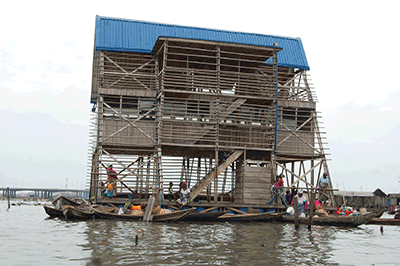In 2013, the community received a boost from the United Nations Development Fund (UNDP), which commissioned a Nigerian architect, Kunle Adeyemi, to design a school that floats on 256 recycled plastic barrels.
Makoko Floating School is a prototype structure that members of the community hope would address school congestion. The three-storey floating structure adapts to the tidal changes and varying water levels, making it invulnerable to flooding and storm surges. It is designed to use renewable energy, to recycle organic waste and to harvest rainwater. The structure accommodates 100 children who attend school by boat and, after school hours, leave also by boat.
Also in April this year, international interest in Makoko was rekindled when the President of Ford Foundation, Darren Walker, visited the slum. He bought into the Makoko Heritage, describing the slum as “amazing, awesome” and promised to do everything within his power to ensure it retains its heritage.
His words: “I feel at home and I am inspired. This is not just a community, but a vibrant community.”
He praised the people for sustaining the passion to retain their heritage, adding: “The world is watching you.”
For Makoko residents, hope has continued to rise upon intervention from abroad.
Walker did not just visit; he also had a meeting with the richest man in Africa, Aliko Dangote, on how to exploit the huge resources on the continent to help the under-privileged, including Makoko dwellers.
If all goes well, Makoko community may wear a new look soon.
David Awhajogbe, 14; Francis Pago, 12; and Deborah Awhi, 13; are students of Whanayinna Nursery and Primary School, Makoko. They all have a request for the Lagos State governor, Babatunde Fashola: to help build a befitting school in their community.
Presently, these three and 75 others attend Whanayinna Nursery and Primary School; the only school in the bustling Makoko slum. The school was built by Yacht Club.
Already, 25 pupils have passed out after writing the secondary school common entrance examination, and 218 others are awaiting admission, said the coordinator of the school, Noah Shemede.
Though the parents are willing to educate their wards, the facilities are not there. Besides, the pupils lack textbooks which are compulsory for proper learning.
Primary 5 pupils offer 11 subjects, including English and Mathematics, while Primary 2 pupils offer seven.
A class teacher in the school, simply identified as Joshua, who earns N10,000 as monthly salary, explains that language barrier is the greatest difficulty. He has to explain to his pupils in a local language.
Makoko’s only English-speaking primary school was recently complemented by a French-speaking one. The English-speaking school is built on an uneven reclaimed land, surrounded by constantly charging waters.
The slum called Makoko shares a coastline border with the prestigious University of Lagos (UNILAG) and stretches along the fringe of the Lagos lagoon from Yaba to Bariga. A drive on the Third Mainland Bridge or a boat ride on the lagoon reveals murky waterways that bisect a houses-on-lagoon fishing enclave.
The features of the community have remained unchanged over the years. The swirling cloud of smoke, the rich tangy smell of fresh fish – smoked and dried, children frolicking about in canoes or perched metres above the dirty lagoon, a bevy of women with canoes full of wares on the waterways, domestic animals (cats, goats, dogs) stuck in their homes-on-water watching the world without interest, and, of course, the never-ending scenery of men returning from fishing and logging expeditions.
All of these and more activities take place right on the brackish water of the lagoon.
Makoko’s rustic charm is accentuated by the stark contrast of the surrounding sub-urban metropolis of Lagos, a kind of appeal that awakens curiosity. And, though, not a tourist destination by any standard, Makoko attracts significant interest from the outside world.
An estimated 45,840 people reside in Makoko in housing units built on stilts. However, the area was not officially counted as part of the 2006 census and the population today is considered to be much higher.
The community has no roads, no land and no formal infrastructure to support day-to-day survival. In many ways, Makoko epitomises the most critical challenges posed by urbanisation and climate change in coastal Africa.
On the lagoon, there are eateries as there are other needful service providers such as barbers, tailors, chemists, boat repairers and borehole owners. Football lovers have the privilege of watching their favourite European clubs play as there is a viewing centre where they gather.
There are churches of different denominations – Mountain of Fire and Miracles (MFM) Ministries, Redeemed Christian Church of God (RCCG), Celestial Church of Christ (CCC) and Cherubim and Seraphim (C&S) – on the lagoon, aside others like St. Andre du Lac Catholic Church that operate on the dry land area of Makoko. The community also has two mosques.
About four years ago, the Lagos State government demolished some shanties around the coastal lines. Makoko was affected. The residents protested and engaged lawyers to argue their case. Demolition was stopped, leaving behind a section of the expansive slum devastated.













